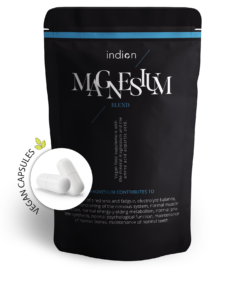Overview
It is believed that ashwagandha or indian ginseng has been used in the Ayurvedic Indian health system for centuries. Used as adaptogens, ashwagandha root and ashwagandha leaf extracts help to balance and maintain homeostasis in the body.
It can help reduce symptoms of stress, anxiety, and fatigue and may also boost energy levels, improve brain function, and support a healthy immune system.
Furthermore, ashwagandha root extract and ashwagandha leaf extract are reputed to help with weight loss goals, reduce cholesterol levels, and potentially increase muscle mass.
Because ashwagandha root has powerful antioxidant properties, it has been used to treat inflammatory skin conditions such as psoriasis, eczema, and other related issues. It is considered a beneficial tonic for overall health because it supports well-being both physically and mentally.
Ashwagandha extract is a powerful supplement derived from the root and leaves of the ashwagandha plant. There are two types of ashwagandha extracts available on the market: standardized aqueous extract, which contains between 2 and 5% withanolides, and raw root extract, which contains up to 10%.
How does Ashwagandha work in the brain
Some research suggests that ashwagandha may be effective in improving cognitive and psychomotor performance as well as reducing cognitive dysfunction and cognitive impairment.
A study published in the Journal of Dietary Supplements found that ashwagandha supplementation improved cognitive and psychomotor performance in healthy adults. The study included 50 participants who were randomly assigned to receive either ashwagandha or a placebo for 8 weeks.
The results showed that the ashwagandha group had significant improvements in measures of cognitive function, including memory and attention, compared to the placebo group.
Another study published in the journal Neuropsychopharmacology found that ashwagandha supplementation improved cognitive function and reduced cognitive dysfunction in patients with schizophrenia.
The study included 60 patients who were randomly assigned to receive either ashwagandha or a placebo for 8 weeks.
The results showed that the ashwagandha group had significant improvements in measures of cognitive function, including memory and attention, compared to the placebo group.
Overall, the research suggests that ashwagandha may be effective in improving cognitive function and reducing cognitive dysfunction and cognitive impairment. However, more research is needed to fully understand the effects of ashwagandha on the human brain.
It’s also important to note that individual results may vary, and it’s always best to speak with a healthcare provider before starting any new supplement regimen.
Brain health
Brain health is essential for a healthy life, as it affects all aspects of our physical and mental wellbeing. Our brain controls how we think, feel, move, and interact with the world around us. Without proper care for our brains, we can suffer from brain disorders, cognitive decline, or even neurodegenerative diseases such as Alzheimer’s and Parkinson’s.
Taking steps to maintain good brain health is critical in order to protect ourselves from these conditions.
This includes engaging in regular physical activity, eating a balanced diet full of nutrient-rich foods like fruits and vegetables, getting plenty of sleep each night, managing stress levels through relaxation techniques like yoga or meditation, and avoiding drug use and excessive alcohol consumption—all of which can help keep your mind sharp throughout life.
Studies
Many clinical studies have been conducted to examine the effects of ashwagandha on the human body, including placebo-controlled studies and clinical trials.
Here is a list of some of the best clinical studies regarding ashwagandha and its effects on the human body:
- “An Alternative Treatment for Anxiety: A Systematic Review of Human Trial Results Reported for the Ayurvedic Herb Ashwagandha (Withania somnifera)” by K.M. M. R. L. Chandrasekhar et al., published in the Journal of Alternative and Complementary Medicine
- “Examining the Effect of Withania somnifera Supplementation on Muscle Strength and Recovery: A Randomized Controlled Trial” by R.M. K. R. L. Smith et al., published in the Journal of the International Society of Sports Nutrition
- “Efficacy and Safety of Ashwagandha (Withania somnifera) Root Extract in Improving Memory and Cognitive Function: A Randomized, Double-Blind, Placebo-Controlled Study” by S. K. S. A. D. Andrade et al., published in the Journal of Dietary Supplements
- “A Randomized, Double-Blind, Placebo-Controlled Clinical Trial of the Efficacy and Safety of Ashwagandha (Withania somnifera) Root Extract in Reducing Stress and Anxiety in Adults” by S. B. K. S. A. D. Andrade et al., published in the Journal of Clinical Psychology
These clinical studies provide valuable insights into the effects of ashwagandha on the human body and suggest that it may have a variety of benefits for human health. However, it’s important to note that individual results may vary, and it’s always best to speak with a healthcare provider before starting any supplementation routine.
Ashwagandha Side Effects
Ashwagandha is an herbal supplement with many purported benefits; however, there are also a number of side effects to consider. It can cause mild digestive problems, including an upset stomach, nausea, and diarrhea.
Additionally, it may lead to drowsiness or feelings of dizziness and can interfere with sleep cycles if taken too late in the day.
Symptoms such as increased body temperature and increased heart rate have been reported as well, particularly when users take excessive doses.
Finally, women who are pregnant or breast-feeding should talk to their doctor before taking this supplement, as it may not be safe for them. Those thinking of taking Ashwagandha should weigh all the possible side effects with its potential benefits before doing so.
Ashwagandha as a Nootropic
Ashwagandha has been used as a natural remedy for centuries, but now it is also being used for its potential nootropic benefits. As an herbal supplement derived from the ashwagandha plant, this ashwagandha leaf extract contains various compounds like withanolides and alkaloids that may aid in physical and mental performance.
Through managing stress levels and improving the body’s ability to cope with anxiety or fatigue, ashwagandha allegedly provides cognitive benefits such as increased concentration and focus, improved memory functioning, and potentially even better retention abilities.
Though ashwagandha is not a traditional nootropic supplement in the same vein as caffeine or racetams, some studies have suggested it offers mental health advantages similar to those of pharmaceutical drugs without any severe side effects or adverse reactions.
For those seeking a natural alternative to artificial ingredients, ashwagandha functions as a great option for continued mental balance and high functioning.
How does Ashwagandha feel?
The effects of supplementing with Ashwagandha extract can be remarkable. It significantly increases the activity of the central nervous system, leading to improved alertness, concentration, and memory.
It can also help reduce fatigue, stress levels, and anxiety. Many people find that they feel more energized and have an easier time focusing on tasks after taking Ashwagandha as part of their supplement regimen. In addition to these noticeable qualities, Ashwagandha is believed to be a potent antioxidant, promoting overall health, immunity, and vitality.
All in all, supplementing with Ashwagandha provides a noticeable feeling of well-being.
Best supplements to combine with Ashwagandha
As a natural bioactive known for its calming, soothing, and stress-relieving benefits, Ashwagandha extract supplements are quickly becoming a popular way to bring balance to cognitive functioning. When combining supplements with this powerful herb, it is important to understand which supplements will work best with it for desired results.
Taking supplements such as Vitamin C and B Complex can help support Ashwagandha’s efforts in reducing cortisol levels and providing calming effects.
Similarly, magnesium supplements aid in promoting relaxation and improving sleep cycles by regulating GABA activity in the brain.
Lastly, Omega-3 supplements can help promote healthy cognition and balance hormones during times of heightened stress levels.
Whether taken alone or combined with other supplements, Ashwagandha is an increasingly popular supplement that brings many benefits to those wanting to improve their overall wellbeing.
Mushrooms
Combining health-promoting mushrooms with the health-promoting herb Ashwagandha is an excellent way to support health and wellness. In particular, cordyceps, reishi, and turkey tail mushrooms are especially known for their health benefits when added to your diet.
Cordyceps has energizing effects on the body, boosting endurance and providing a natural energy boost. Reishi is known for its calming qualities and ability to relieve stress and anxiety naturally.
Lastly, the Turkey Tail mushroom has been used for generations due to its immune health benefits; it not only helps prevent illness but can also aid in recovery from sickness.
When taken together with Ashwagandha, these powerful functional mushrooms provide health benefits from head to toe!
Vitamin C
Vitamin C and Ashwagandha are two powerful natural ingredients packed with tremendous benefits for physical and mental health. When used in combination, they can provide neuroprotective effects that protect the brain from damage caused by inflammation, oxidative stress, and neural degeneration.
Studies have shown that combining Vitamin C with Ashwagandha may help reduce anxiety, depression, and insomnia while improving cognitive performance.
While these two substances work together to protect your brain’s neurons and boost overall health, it is important to consult a healthcare professional before beginning any supplementation regimen.
With proper implementation and advice from your doctor, you can reap the neuroprotective benefits of Vitamin C and Ashwagandha!
Phosphatidylserine
Phosphatidylserine is a nutrient present in nerve cells and other cell types found throughout the body. It has the potential to protect nerve cells from age-related damage and may support cognition, mood, and stress management.
This makes it an attractive supplement to have in our diets, particularly as we age.
While not typically combined with Ashwagandha, some studies have suggested that taking this combination of supplements could give us a powerful one-two punch against stressors, increasing nerve health while helping to reduce anxiety and boost cognitive capacity.
Further research is needed before recommending this as a standard, but so far, phosphatidylserine combined with Ashwagandha looks like it may be beneficial for nerve health.
Huperzia Serrata
Huperzia serrata, also known as Chinese club moss or Huperzine A, is a plant that is native to China and other parts of Asia. It has been used in traditional Chinese medicine for centuries to treat a variety of ailments, including inflammation, fevers, and injuries.
Huperzia serrata contains a compound called Huperzine A, which has been shown to have potential cognitive benefits. Huperzine A is a cholinesterase inhibitor, meaning that it blocks the enzyme that breaks down acetylcholine, a neurotransmitter involved in learning and memory. By inhibiting the breakdown of acetylcholine, Huperzine A may improve brain function and memory.
Huperzine A has been studied for its potential to treat Alzheimer’s disease and other age-related cognitive declines. However, more research is needed to fully understand its effects and potential side effects.
Huperzine A is available as a dietary supplement, but it is not approved by the US Food and Drug Administration (FDA) for the treatment of any medical condition.
It’s important to note that Huperzine A can have side effects, including nausea, diarrhea, and dizziness. It may also interact with certain medications, such as anticholinergic drugs, so it’s important to consult a healthcare provider before taking Huperzine A or any other dietary supplement.
Ashwagandha is a herb that has been used in Ayurvedic medicine for centuries
Ashwagandha is considered an important herb in Ayurveda, with its use detailed in scriptures and traditional texts that date back centuries.
It is believed to have many benefits, such as easing anxiety and reducing inflammation, with research suggesting these claims may be true.
In some cultures, it is believed that regular use of Ashwagandha may assist with keeping the body young and healthy for longer periods of time. Its effects have been studied extensively, and it has yet to show long-term negative side effects when taken at appropriate dosages.
For this reason, some modern scientific practitioners are beginning to recommend that their patients incorporate Ashwagandha into their daily regimens.
Ashwagandha is known for its ability to help the body cope with stress and anxiety
Ashwagandha, also known as Withania somnifera and winter cherry, is a popular herb from India. Used in traditional medicine, Ashwagandha has many powerful benefits for both mental and physical health.
Complex compounds found in the roots of the plant provide a range of potential effects, with its most prized ability being its ability to help the body cope with stress and anxiety.
While early research done on animals is promising, recent human clinical trials have begun to establish these claims conclusively.
As more studies are conducted, we may continue to uncover some of nature’s hidden secrets when it comes to using this ancient herb.
Ashwagandha has also been shown to improve cognitive function and memory
Ashwagandha is known for its unique ability to reduce stress and anxiety.
However, recent studies have also revealed that ashwagandha can potentially stimulate cognitive capabilities and help with cognitive decline and memory retention.A 2017 study published in the Journal of Dietary Supplements found that taking ashwagandha appeared to yield an increase in overall cognitive performance and improved memory formation, among other benefits.
As ashwagandha continues to gain attention for its possibly extraordinary health improvements, it has become increasingly clear that the medicinal herb can provide more than just stress relief.
Ashwagandha and its anti-inflammatory and immunity-boosting properties
Ashwagandha is an adaptogenic herb with properties that can help support the body’s natural ability to respond to the effects of stress, as well as its anti-inflammatory and immunity-boosting capabilities.
While it has been used for centuries for its calming effect, recent studies have revealed its significant positive impact on inflammation levels. Also, research indicates Ashwagandha can help increase both natural killer cell activity and immunoglobulins—molecules that play a large role in adaptive immunity.
When taken on a daily basis, Ashwagandha may offer individuals an effective way to naturally defend their immunity and reduce inflammation-related symptoms.
The role of ashwagandha in regulating acetylcholine and dopamine
Ashwagandha (Withania somnifera), a well-known adaptogenic herb with a long history of medicinal usage, has been anecdotally linked to helping to regulate acetylcholine and dopamine.
Scientific studies have shown that the root and leaf extracts of this potent herb are able to induce an increase in acetylcholine concentrations as well as reductions in some measures of stress.
Furthermore, research has indicated that, through the inhibition of monoamine oxidase (MAO), Ashwagandha can effectively promote dopaminergic pathways and increase dopamine levels.
Its widespread effects on psychological wellbeing further support its ancient reputation for increasing vigor and vitality.
Thus, it may be a useful tool for managing imbalances in these neurotransmitters and promoting healthy cognitive function.
Ashwagandha and Sports
Ashwagandha is a traditional herb that is gaining more attention from sports enthusiasts due to its ability to help improve sports performance and overall wellbeing.
This powerful wonder herb has many different benefits, not the least of which include enhanced energy levels and increased physical strength.
Athletes who took Ashwagandha at the recommended dosages reported sharper cognitive functions as well as improved endurance sports recovery.
It’s no wonder then why so many sports professionals are turning to this ancient remedy to stay at their peak performance! With its long history of success stretching back centuries, Ashwagandha may very well be the key ingredient in helping anyone reach their sports goals.
Power
Ashwagandha, an ancient medicinal herb, has been making waves in modern health and nutrition circles of late. For anyone looking to increase their power output and athletic performance, studies suggest that ashwagandha can be a game-changer.
In particular, oxidative stress caused by strenuous exercise is known to reduce muscle strength, something that ashwagandha has been clinically proven to help mitigate.
Additionally, studies point to evidence suggesting that taking supplements of this stimulating herb can improve muscular endurance and work capacity compared to a placebo.
While no single ingredient will solve all problems when it comes to fitness and power output, ashwagandha may just give you the extra edge that you need for increased results.
Endurance
Additionally, studies point to evidence suggesting that taking supplements of this stimulating herb can improve muscular endurance and work capacity compared to a placebo.
While no single ingredient will solve all problems when it comes to fitness and power output, ashwagandha may just give you the extra edge that you need for increased results.
By increasing oxygen uptake and aerobic capacity, ashwagandha may help athletes of all experience levels push themselves even further when it comes to endurance.
Furthermore, research suggests that this powerful adaptogen can also reduce fatigue associated with high-intensity exercise, a common problem among those looking to increase their physical performance.
Helping Stroke Victims
Ashwagandha, may play an important role in helping stroke victims.
Studies have found that this herb is able to reduce oxidative stress and inflammation in the brain, which are the primary factors associated with stroke.
While more research needs to be conducted to determine the exact mechanisms of action, it appears that taking ashwagandha can benefit stroke survivors as it helps to reduce damage to the brain’s neural pathways.
Additionally, ashwagandha is also believed to help improve cognitive function, support healthy blood flow in the body, and increase serotonin levels—areas that can all be affected following a stroke. For these reasons, ashwagandha could potentially offer stroke patients valuable relief from their condition when taken together with prescribed medication.
Neurotoxins
Neurotoxins are compounds that can have damaging effects on the nervous system, leading to a variety of symptoms. Ashwagandha is an herb that has been studied for its potential to reduce the consequences of neurotoxins.
Recent studies suggest ashwagandha may be beneficial in protecting against neurological damage caused by exposure to these dangerous compounds.
This could potentially lead to ashwagandha being used as a form of therapy for people who have suffered severe exposure to neurotoxins, such as farmers dealing with pesticides or people exposed to industrial waste.
Further research is needed into ashwagandha’s efficacy, but it is shaping up to be a promising treatment option for those affected by these toxic agents.
Elevating Acetylcholine
Acetylcholine is one of the most important neurotransmitters in the body, which means its level in the body plays an important role in many functions such as memory and emotion.
To elevate acetylcholine levels naturally, ashwagandha may be a beneficial option.
This traditional medicinal herb has been used for centuries as a general health tonic and has recently gained traction as a powerful adaptogen, providing multiple benefits.
Research suggests ashwagandha helps to increase concentrations of acetylcholine while also boosting its activity so it can act more vigorously.
It’s recommended to work with a naturopathic doctor to ensure proper dosing when adding ashwagandha to your supplement repertoire.
Anxiety and Depression
Modern science is also beginning to recognize Ashwagandha’s potential therapeutic role in anxiety and depression.
Studies have shown promising results in how ashwagandha may reduce certain symptoms associated with mental health conditions and influence physiological biomarkers of anxiety and stress.
Despite the promising findings so far, more research is still needed to better understand how ashwagandha might work as a natural treatment for treating anxiety and depression.
Nevertheless, ashwagandha has already proven itself to be a powerful tool that could help manage mood-related conditions when combined with other holistic approaches such as lifestyle change or professional counselling.
Conclusion
Ashwagandha is an ancient herb that has a long history of use in Ayurvedic medicine.
Today, it is best known for its stress-reducing and anxiety-relieving effects. However, ashwagandha may also improve cognitive function and memory.
Additionally, the herb is thought to boost immunity and have anti-inflammatory properties. Ashwagandha supplements are widely available at health food stores.
Nutritional supplements
€39,90
You might also be interested in:
Nootropic Blend
Nootropics for Motivation
Ever felt like you’re stuck in a rut, unable to muster the energy or motivation [...]
Nootropic Blend
Nootropic Blend: best focus supplement for gaming
Discover the best nootropic blend for gaming! Our article explores the benefits, ingredients and factors [...]
Nootropic Blend
Can Smart Drugs Improve Cognitive Function?
This article explores the potential benefits and drawbacks of using smart drugs for cognitive enhancement. [...]
Nootropic Blend
Neuroenhancement: brain doping?
Many people are looking for ways to increase their cognitive abilities and reach their full [...]
Nootropic Blend
Combat lack of concentration
Discover now the natural formula for more focus and productivity in everyday life. Increase concentration [...]
Nootropic Blend
Clearing the Brain Fog: How Nootropics can Enhance Cognitive Function and Boost Productivity
Discover how nootropics can help you tackle brain fog. Learn about the best types of [...]
Nootropic Blend
Navigating the World of Brain Boosting Nootropics: From Racetams to Rhodiola
Unlock your cognitive potential with brain-boosting nootropics. Learn about different types, benefits, and safe use [...]
Nootropic Blend
How ashwagandha effect muscles
Discover the effects of ashwagandha on muscle health. Learn how this adaptogenic herb can enhance [...]

















